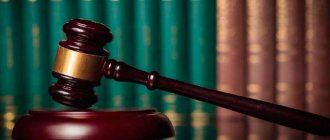Quick navigation
- How to file a claim for tampering with evidence?
- Features of procedural activities before the appointment and conduct of the procedure for checking the evidence base
- How is the reliability of evidence verified?
- What results are possible during an audit?
- What does judicial practice show?
- The best lawyers
Allegations of tampering with evidence are a documented challenge by one of the parties to the proceeding based on his belief that evidence presented by one or more of the other parties to the trial is fraudulent. In this case, it is necessary to have arguments confirming the validity of this belief. Petitions of this type differ from other types of statements provided orally or in writing regarding the dubiousness of materials that do not require consideration in a special manner within the framework of a court hearing.
It is worth noting that today the problem of falsification of evidence is quite common, including within the framework of consideration of a case with the participation of the Arbitration Court. For a long time, until the introduction of a special procedure, the initiation of which is carried out on the basis of the application considered in this material, the resolution of controversial issues regarding the evidence base was carried out in the manner of studying requests for the appointment of an additional examination, which is intended for an in-depth examination of the evidence base. Legal and judicial practice shows and clearly confirms the sufficient prevalence of cases of filing such petitions in order to delay the judicial process. Thus, thanks to the introduction of the procedure of the Arbitration Procedure Code of the Russian Federation in 2002, procedural activities are significantly streamlined. In turn, a warning about the likelihood of criminal punishment restrains the parties’ desire to use this method of refutation to delay the process.
With the approval of a procedure aimed at verifying evidence, the evidence base used by participants in legal proceedings, from unreliable materials that are deliberately fraudulent. But even in such conditions, there are still situations in which the possibility of recourse to verification is used to slow down the judicial process while additional examination is carried out.
The reasons for this may be hidden in the prevalence of cases when the results of the examination remain probabilistic. This means that the parties do not have direct confirmation and confirmation of the falsification or legality of this or that evidence. At the same time, bringing a certain person to criminal liability based on the presentation of false evidence or a false statement of falsification of the evidence base is rather an exception. This is due to the inability to fully confirm the subjectivity of both compositions. At the same time, the procedure aimed at verifying the evidence base does have a positive effect, which does not exclude the possibility of resorting to it on legal grounds. In order to initiate an inspection, the participant must prepare a corresponding petition.
How to file a claim for tampering with evidence?
An application for falsification must be submitted exclusively in writing. Oral claims regarding the falsity of a particular document or material cannot be sufficient grounds for ordering an additional examination. In accordance with the available clarifications on this matter, the appointment of a special examination is carried out after one of the parties submits a corresponding written request. An oral statement of falsification provides only for entry into the protocol with the subsequent provision of explanations by the court regarding the procedure for filing written petitions in accordance with article number 161 of the relevant code. It is not possible to achieve other results based on an oral complaint.
The current legislation of the Russian Federation does not contain specific requirements regarding exactly how a written application should be drawn up. At the same time, a statement about the falsification of documents and materials in writing is not always a statement about falsification in accordance with Article No. 161 (subject to the application of the necessary additional procedure).
When preparing allegations of tampering with evidence, this written statement lists the following information:
- Name of the judicial authority.
- Specific case number.
- Data about evidence that seems unreliable to an interested participant in the trial.
- Rationale for critical assessment of this evidence.
It is important to remember that absolutely all actions of persons participating in the trial constitute a certain characteristic of this person from the point of view of the court. Thus, a convincing and reasoned statement becomes an additional plus in favor of the applicant’s good reputation in court and will help in considering the case according to the principles of fairness and legality. Given this, it is extremely important to enlist the qualified support of an experienced lawyer.
Two forms of verification: examination and comparison of evidence
There are two ways to check evidence for fraud.
First form of verification: forensic examination
It is possible to check the validity of a statement of forgery - to determine whether the evidence is really falsified - through a forensic examination.
Ordering an expert examination is the right, not the obligation of the court
Second form of verification: comparison with other evidence
The court will not order an examination if the evidence can be verified by comparison with other evidence.
The court may also invite participants to provide other evidence of their case on this issue.
The court chooses a simpler path: if it is possible without an examination, then why carry it out?
If the totality of evidence does not allow one to draw an unambiguous conclusion about falsification or its absence, then they resort to the help of experts.
How is the reliability of evidence verified?
Upon receipt of a complaint from a person who is a participant in the process and has provided a controversial evidence base, or an objection to the exclusion of a particular document, the Arbitration Court begins the verification procedure. The relevant code of the Russian Federation provides for several options for action. The first of these is the appointment of a special examination. In most cases, the court uses documents as evidence. Thus, to confirm or refute the falsification of evidence, the following types of examinations can be assigned:
- handwriting,
- examination of the prescription of the document.
The specific choice is made taking into account the nature of the arguments presented by the party, as well as the actual circumstances of the case. If the signatories are on the same side that provided the documents, ordering a handwriting test is unprofitable. As for the examination of the prescription of a document, its productivity is determined by the urgency of the audit. Today, in many regions of the Russian Federation, the queue for special examination is quite long. Thus, during the period of the audit, the technical possibility of clarifying how long ago the document was drawn up is lost. The relatively high cost of the examination is also a decisive factor. Its use is not advisable in all cases. You can apply for an expert review at the same time as filing applications for falsification of evidence.
To carry out an audit to confirm or refute the falsification of evidence, the court may require certain documents. For example, in the case of challenging the certificate of ownership of real estate, the most rational and accessible method of verification is to request documents from the state register.
Depending on the court's position, alternative verification methods may be used. For example, the court may involve a third party to provide the necessary explanations, send relevant requests to authorities or officials, compare other information from the evidence base, and so on, taking into account the circumstances of the proceedings.
The final court decision based on the results of the adoption of an allegation of falsification of evidence and its consideration is subject to mandatory entry into the protocol. If the court takes certain procedural measures, then at the same time it issues an appropriate ruling.
What results are possible during an audit?
A check to confirm or refute the fact of falsification of evidence can be carried out promptly (subject to using the method of requesting information or involving third parties for questioning) or drag on for several months. Based on the results of receiving explanatory documents in the form of expert opinions, inquiry certificates, extracts, and so on, the following situations may arise in relation to dubious evidence:
- An unequivocal refutation based on an expert opinion, as well as other documents and explanations, for example, in accordance with the FAS resolution of April 29, 2014.
- Unambiguous confirmation.
- Uncertain decision. It is worth noting that this court verdict is not rare. We have already said earlier that expert opinions can be probabilistic in nature, on the basis of which the evidence actually “hangs” and is assessed in a system with the rest.
The results of checking the fact of falsification of evidence are assessed by the court along with other information from the evidence base in a particular case. Once additional materials have been acquired, there is no provision for additional entries or additional analysis of questionable evidence in the record, or for a judicial determination. The case is considered as usual.
An interested participant in arbitration proceedings has the right to challenge the received expert opinions or new evidence in the case in the standard manner. He also has the right to submit a reasoned request for a repeat expert review. It is recommended to submit this application after interviewing an expert.
General provisions
Article 186 of the Code of Civil Procedure of the Russian Federation indicates that the parties to the dispute have the right to declare the discovery of false evidence. In this situation, the court has several options:
- order an examination;
- invite the parties to present other evidence;
- establish that the facts stated in the application have not been confirmed.
If the plaintiff presents a copy of the additional agreement to the contract, and the defendant indicates that the document is fraudulent, the court may require the production of the original.
Most often, paper media are subject to falsification. Forgery of documents can be expressed as:
- text distortion;
- signature falsification;
- removal or inclusion of new sheets in the document (protocol).
Cases of falsification of information in electronic form are also becoming more frequent. Interested parties try to change the date or time of receiving messages and distort their content.
What does judicial practice show?
Judicial practice in arbitration cases in which attempts were made to refute certain evidence shows the following:
- 1. If a participant in arbitration proceedings refuses to exercise the right to check regarding falsification of evidence, expert opinions that were obtained after the court decision entered into legal force do not become a sufficient independent basis for re-examining the case due to newly discovered circumstances. Thus, falsification of evidence when critically assessed by a participant in the proceedings cannot be delayed and must be checked immediately.
- 2. Today there is a subjective attitude of courts towards verification. Thus, the results of the audit are considered by the courts in the context of other evidence in the case. For example, in one of the court proceedings, an allegation of falsification of evidence was received with the requirement to order and conduct an examination. The applicant provided confirmation of payment for this examination along with the petition, but the court refused to verify it, taking into account the totality of the remaining evidence and evaluating it in the system. The appeal commission also did not consider the evidence controversial and agreed with the court decision.
- 3. It is important to note that even in conditions where evidence is excluded from the evidentiary base, it can significantly strengthen the position of the party to the trial to whom this evidence was provided.
Analysis of evidence is one of the most labor-intensive procedures within the framework of procedural activities. It requires a responsible and thoughtful approach. It is extremely important to prepare a substantiated statement regarding falsification of evidence to the Arbitration Court and timely request verification in order to use this right to obtain a positive outcome in the case. If the evidence presented by the opposite party seems unreliable to you, but you do not have experience with falsification and analysis of evidence, then contacting the competent lawyers of the Moscow Municipal Bar Association becomes the optimal solution. Our specialists will help you exercise the right to petition for false information and achieve the maximum possible positive result in the Arbitration Court.
How to report falsification of evidence in arbitration court?
Nikolay Andrianov,
partner,
law office "Exiora"
Moscow
In a written form
No evidence has pre-established force for the court (Part 5 of Article 71 of the Arbitration Procedure Code of the Russian Federation).
Each piece of evidence is individually assessed by the court from the point of view of its relevance, admissibility and reliability, and the totality of evidence collected in the case - from the point of view of its sufficiency and mutual connection (Part 2 of Article 71 of the Arbitration Procedure Code of the Russian Federation).
Evidence is considered reliable if the information contained in it corresponds to reality (Part 3 of Article 71 of the Arbitration Procedure Code of the Russian Federation).
Within the meaning of Art. 71 of the Arbitration Procedure Code of the Russian Federation, the court evaluates the reliability of each evidence according to its internal conviction, regardless of whether the reliability of a particular evidence is disputed by other persons participating in the case. The court reflects the results of the assessment of evidence, including from the point of view of its reliability, in the decision, giving the reasons why certain evidence was accepted or rejected (part 7 of article 71, paragraph 2 of part 4 of article 170 of the Arbitration Procedure Code RF).
In turn, the party participating in the adversarial process has the right to challenge the relevance, admissibility or reliability of the evidence presented by the other party (Part 1 of Article 41 of the Arbitration Procedure Code of the Russian Federation). One of the ways to challenge the reliability of evidence is to claim its falsification (Article 161 of the Arbitration Procedure Code of the Russian Federation).
In Part 1 of Art. 161 of the Arbitration Procedure Code of the Russian Federation contains a rule according to which an application by a person participating in the case about falsification of evidence presented by the other party is submitted to the arbitration court in writing. This is due to the fact that, by virtue of Part 3 of Art. 65 of the Arbitration Procedure Code of the Russian Federation, each person participating in the case must disclose the evidence to which he refers as the basis for his claims and objections to other persons participating in the case before the start of the court hearing or within the period established by the court. Thus, persons participating in the case, by default, have the opportunity to familiarize themselves in advance with the evidence presented by other participants in the process, and, if necessary, prepare a written statement about falsification.
If a statement about falsification of evidence is made orally during a court hearing, then the arbitration court must reflect this statement in the protocol and explain to the person participating in the case who made the said oral statement the right to submit a written statement about falsification of evidence (clause 36 of the Information Letter of the Presidium Supreme Arbitration Court of the Russian Federation dated August 13, 2004 No. 82 “On some issues of application of the Arbitration Procedural Code of the Russian Federation”). At the same time, in order for the person who made an oral statement about falsification of evidence to exercise his procedural right to submit a corresponding written statement, as required by Part 1 of Art. 161 of the Arbitration Procedure Code of the Russian Federation, the arbitration court must provide him with the time necessary to prepare a written statement (Resolution of the Federal Antimonopoly Service of the West Siberian District dated 02/07/2013 in case No. A45-14469/2012).
If a written statement about falsification of evidence by a person participating in the case is not filed, the arbitration court has no grounds for checking it according to the rules of Art. 161 of the Arbitration Procedure Code of the Russian Federation (decrees of the Arbitration Court of the Moscow District dated 03.24.2016 No. F05-1981/2016 in case No. A40-60760/2014, Arbitration Court of the Volga-Vyatka District dated 05.16.2017 No. F01-247/2017 in case No. A43-13489 /2016).
As a general rule, an application for falsification of evidence in accordance with Art. 161 of the Arbitration Procedure Code of the Russian Federation can be done when considering a case in the arbitration court of first instance. In the appellate court, an application for falsification can be filed only in cases where, due to objective reasons, the person sending it was not previously aware of certain facts. At the same time, the statement of falsification, which is presented in the court of appeal, must be accompanied by evidence justifying the impossibility of submitting it to the court of first instance (paragraph 4, paragraph 26 of the Resolution of the Plenum of the Supreme Arbitration Court of the Russian Federation dated May 28, 2009 No. 36 “On the application of the Arbitration Procedural Code of the Russian Federation when considering cases in the arbitration court of appeal").
The court does not believe the words
Judicial practice proceeds from the fact that a written statement about falsification of evidence must be justified. In other words, the person participating in the case must not assert unfoundedly that the evidence is falsified, but indicate the reasons why he doubts its reliability (resolutions of the Federal Antimonopoly Service of the Moscow District dated October 5, 2004, September 28, 2004 No. KG-A40/8710-04 -P, FAS Volga-Vyatka District dated November 14, 2012 in case No. A43-31517/2011, Arbitration Court of the North-Western District dated October 17, 2016 No. F07-6274/2016 in case No. A56-12918/2014).
The verification of the validity of the application for falsification of evidence is carried out by the arbitration court in the manner prescribed by Art. 161 of the Arbitration Procedure Code of the Russian Federation, according to which the arbitration court:
– explains the criminal legal consequences of such a statement (criminal liability for falsification of evidence is provided for in Article 303 of the Criminal Code of the Russian Federation; hereinafter referred to as the Criminal Code of the Russian Federation);
– excludes the disputed evidence, with the consent of the person who presented it, from the evidence in the case (in this case, the case is considered based on the available evidence);
– checks the validity of the statement of falsification if the person who presented the relevant evidence has raised objections regarding its exclusion from the evidence in the case.
To verify the validity of an application for falsification of evidence, the arbitration court may order an examination, request other evidence, or take other measures. At the same time, the appointment of an examination is only one of the possible (but not mandatory) ways to verify the validity of a statement of falsification (resolution of the Arbitration Court of the Ural District dated September 12, 2014 No. F09-5301/14 in case No. A76-25069/2013, Arbitration Court of the North-Western District dated 05/19/2016 in case No. A56-44170/2015, Arbitration Court of the Far Eastern District dated 01/23/2017 No. F03-5979/2016 in case No. A59-6240/2015).
Failure of the arbitration court to fulfill its obligations to verify the statement of falsification of evidence (acceptance of evidence in respect of which such a statement was made without verification) indicates a significant violation of the rules of procedural law and serves as a basis for the cancellation of the judicial act adopted in the case (resolution of the Presidium of the Supreme Arbitration Court of the Russian Federation dated 15.12. 2009 No. 13611/09 in case No. A40-81615/08-31-795, dated 10/04/2011 No. 6616/11 in case No. A31-4210/2010-1741, dated 06/25/2013 No. 1095/13 in case No. A59- 910/2012).
And the signature is not mine!
In the fall of 2022, the Judicial Collegium for Economic Disputes of the Supreme Court of the Russian Federation considered three cases on complaints of violation by arbitration courts of the provisions of Art. 161 Arbitration Procedure Code of the Russian Federation.
The dispute in case No. A43-5669/2015 arose from a real estate purchase and sale agreement. The plaintiffs (heirs of the seller) demanded to terminate the contract and return the six sold objects, citing the fact that the defendant (buyer) had not paid for them. The defendant objected to the claim, pointing out that he had properly fulfilled his obligation to pay. In support of his objections, the defendant referred to the acceptance certificate signed by the seller, which contained an indication of the payment made under the contract. The plaintiffs alleged falsification of the transfer and acceptance certificate, noting that the seller’s signature on it was not similar to his signature in the purchase and sale agreement, and therefore asked to appoint a forensic examination. The Arbitration Court of the Nizhny Novgorod Region rejected this application for falsification of evidence and, by Decision dated July 7, 2016, rejected the claim.
The statement of falsification was rejected by the arbitration court of first instance on the grounds that it was unconvincing. The court noted that there is no obvious discrepancy between the signatures on the act and the agreement, and, moreover, the “dissimilarity” of the signatures does not in itself indicate that they were put by different people.
By the decisions of the First Arbitration Court of Appeal dated November 11, 2016, the Arbitration Court of the Volga-Vyatka District dated March 6, 2017, the decision of the Arbitration Court of the Nizhny Novgorod Region dated July 7, 2016 in case No. A43-5669/2015 was upheld.
By the ruling of the Supreme Court of the Russian Federation dated September 28, 2017 in case No. 301-ES17-7046, A43-5669/2015, these judicial acts were canceled and the case was sent for a new trial. The Supreme Court of the Russian Federation came to the conclusion that, by rejecting the request for an examination, the court of first instance essentially deprived the plaintiffs of the opportunity to exercise their procedural rights and obligations to prove their claims. In addition, the Supreme Court of the Russian Federation noted that resolving the issue of the authenticity of the seller’s signature in the transfer and acceptance certificate is important for the consideration of the case, and the court does not have special knowledge to establish the authenticity of the signature.
In case No. A07-2906/2016, the parties (copyright holder and acquirer) signed a preliminary agreement, according to which they agreed to conclude an agreement on the alienation of the exclusive right to a trademark within a year. Subsequently, the acquirer sent the copyright holder a proposal to conclude the main contract, which he refused. In this regard, the acquirer filed a claim with the arbitration court against the copyright holder to conclude the main agreement.
By the decision of the Arbitration Court of the Republic of Bashkortostan dated October 5, 2016, the stated requirements were satisfied.
At the court hearing of the appellate instance, the defendant, on the basis of Art. 161 of the Arbitration Procedure Code of the Russian Federation declared the falsification of the preliminary agreement. The Eighteenth Arbitration Court of Appeal, taking into account that in the court of first instance the defendant explained that he had not signed the preliminary agreement, and also taking into account the visual differences in the signatures of the general director in the passport, in the preliminary agreement and in the statement of falsification of evidence, began to check the validity of the latter. The court warned the parties about criminal liability in accordance with Art. 303, 306 of the Criminal Code of the Russian Federation and, since the plaintiff did not agree to exclude the disputed agreement from the evidence in the case, he raised the issue of ordering a handwriting examination for discussion. At the next court hearing, the plaintiff, however, asked the court to exclude the preliminary agreement from evidence in the case, and the court granted this request. Since the preliminary agreement was excluded from evidence, by the Resolution of the Eighteenth Arbitration Court of Appeal dated December 26, 2016, the decision of the Arbitration Court of the Republic of Bashkortostan dated October 5, 2016 in case No. A07-2906/2016 was canceled and the claim was denied.
The Intellectual Rights Court, considering the case based on the plaintiff’s cassation appeal, came to the conclusion that the appellate court unreasonably accepted the defendant’s statement of falsification of the preliminary agreement for consideration, since he did not give reasons why this statement was not made in the arbitration court of first instance . In connection with this, by the Resolution of the Intellectual Rights Court dated April 14, 2017 No. S01-249/2017, the Resolution of the Eighteenth Arbitration Court of Appeal dated December 26, 2016 in case No. A07-2906/2016 was canceled, and the Decision of the Arbitration Court of the Republic of Bashkortostan dated October 5, 2016 was upheld in force.
By ruling of the Supreme Court of the Russian Federation dated October 26, 2017 No. 309-ES17-9988, A07-2906/2016, all of these judicial acts were canceled and the case was sent for a new trial. The Supreme Court of the Russian Federation indicated that when considering the case in the arbitration court of first instance, the defendant disputed the fact that he had signed the preliminary agreement, but the court, in violation of the requirements of Art. 71 of the Arbitration Procedure Code of the Russian Federation did not examine these arguments and did not give them a legal assessment. The RF Supreme Court also took into account that the defendant essentially did not have the opportunity to prepare a statement about falsification of evidence when considering the case in the arbitration court of first instance, since, having rejected the defendant’s request to transfer the case to jurisdiction (the ruling on this can be appealed), the court did not postpone the trial , and announced a break in it. In addition, the RF Supreme Court took into account that the plaintiff did not send a copy of the preliminary agreement to the defendant along with the statement of claim, but did so much later.
Possible without an application
In the third case, the Arbitration Court of St. Petersburg and the Leningrad Region, in the framework of bankruptcy case No. A56-71402/2015, considered the company’s application to include its claims in the register of claims of creditors of the debtor-individual. The claim was based on an agreement under which the parties agreed that the debtor would pay the company the debt and interest for the latter's fulfillment, as the debtor's guarantor, of its obligations to repay the debt to the bank.
The court hearing to consider this application was adjourned. After a break, in response to the court’s question about whether the persons participating in the separate dispute had any petitions, one of the creditors (the bank) explained that he had a petition to falsify the agreement on the basis of which the claim was made. However, the court did not accept this petition for consideration, citing the fact that a break in the court session was announced to issue a judicial act on the merits of the dispute. By a ruling dated 08/04/2016 in case No. A56-71402/2015, the Arbitration Court of St. Petersburg and the Leningrad Region included the stated claims in the register of creditors’ claims, indicating that statements about falsification of the agreement in accordance with Art. 161 of the Arbitration Procedure Code of the Russian Federation, the bank did not submit a request to appoint an examination. By decisions of the Thirteenth Arbitration Court of Appeal dated December 13, 2016, and the Arbitration Court of the North-Western District dated March 31, 2017, this Determination was upheld.
By the decision of the Supreme Court of the Russian Federation of November 16, 2017 No. 307-ES17-1676 in case No. A56-71402/2015, the acts adopted by the lower courts were canceled, and the separate dispute was sent for a new consideration. The Supreme Court of the Russian Federation noted that before the adjournment in the court session, the arbitration court of first instance did not announce the completion of the stage of examination of evidence, and therefore the refusal to accept for consideration the bank’s application for falsification of evidence contradicts the rules of Art. 159, 163, 167, 184 Arbitration Procedure Code of the Russian Federation. The RF Supreme Court also indicated that the absence of a request to order an examination was not a basis for leaving the application for falsification of evidence without consideration, since a forensic examination in order to verify the validity of such an application can be ordered at the initiative of the court. In relation to the circumstances of this case, the arbitration court of the first instance was obliged to accept for consideration the statement of falsification and, if the party that submitted the agreement refused to exclude it from evidence, verify this statement according to the rules of Art. 161 of the Arbitration Procedure Code of the Russian Federation, including by requesting from the parties additional evidence confirming either the reliability of the disputed evidence, or the presence (absence) of facts in support (refute) of which it was presented.
Source: eZh-Lawyer
Services for citizens and organizations
| Oral (face-to-face) legal consultation with the duty lawyer with the study of documents submitted by the client | from 2,400 rub. |
| Oral (face-to-face) legal consultation with an industry specialist lawyer with the study of documents submitted by the client | from 4,800 rub. |
| Study by a specialist lawyer of the case materials presented by the client, judicial practice in the case, development of the legal position of the defense (using professional legal resources), outside the framework of an oral consultation | from 1,200 rub. |
| Departure of the duty lawyer to the principal | from 3,000 rub. |
| Preparation of the primary written legal document (application, complaint, petition, legal opinion) | from 7,000 rub. |
| Oral (face-to-face) legal consultation from an industry specialist lawyer without studying documents | from 2,400 rub. |
| Oral (face-to-face) legal consultation of the duty lawyer without studying documents | from 1,200 rub. |
| Hourly wages for a specialist lawyer for comprehensive protection of the client’s rights | from 2,500 rub. |








